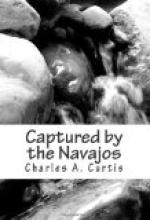I was glad to see the California cavalry officers, and, during the three days of their stay in the valley for rest after a forced march, did the honors to the best of my ability. On the day of their departure the wagons returned loaded with supplies. Instructions were received to send back all but one wagon and six mules.
With the departure of cavalry and wagons, life in the valley settled down to quiet routine. I spent some time in instructing my companions, according to an agreement I had made with their father. Not being a West-Pointer, but a college graduate with a fair knowledge of Greek and Latin, and some other acquirements not considered of military utility, I was able to carry out a desire of the colonel and assist the boys in preparing themselves for college.
We rarely received visits from the outside world. The nearest hamlet was an Indian pueblo, twenty-six miles away, in the Rio Jemez Valley, and representatives of the army seldom had occasion to visit our outposts. The mail arrived from Santa Fe every Saturday afternoon, and left every Monday morning in the saddle-bags of two cavalry express-men.
To the soldiers life in the valleys was very pleasant. Duty was light, and there were no temptations to dissipation or to be out of quarters at night, and there were no confinements to the guard-house for disorder. Evenings were spent over books and papers and quiet games, and the days in drill, repairing buildings, providing the fuel for winter, hunting, and scouting.
As previously referred to, we were in a region of abundant game. The boy corporals accompanied the hunting-parties, and became skilled in bringing down whatever they sighted. Henry, as well as Frank, shot his bear, and soon our floor was covered with the skins of wolves, coyotes, bears, and catamounts, skilfully dressed and tanned by the Cordovas.
And now I must introduce a principal character of my story, a valued friend who took a conspicuous part in our scouting and hunting, and who, later on, did valuable service to myself and my youthful comrades.
Just as I was about to leave Santa Fe for Los Valles Grandes, the regimental adjutant—since a distinguished brigadier-general in the war in the Philippines—gave me a beautiful young setter named Victoriana, and called Vic for convenience. She was of canine aristocracy, possessing a fine pedigree, white and liver-colored, with mottled nose and paws, and a tail like the plume of Henry of Navarre.
The boys, soon after our arrival in the valleys, carrying out a conceit suggested by the letters “U.S.” which are always branded upon the left shoulder of all government horses and mules, marked with a weak solution of nitrate of silver upon Vic’s white shoulder the same characters, and as long as she continued to live they were never allowed to grow dim.
Vic came to me with no education, but plenty of capacity, and the corporals and I spent much time during the long evenings and on the days when we did not accompany the scouting and hunting parties, in training her.




